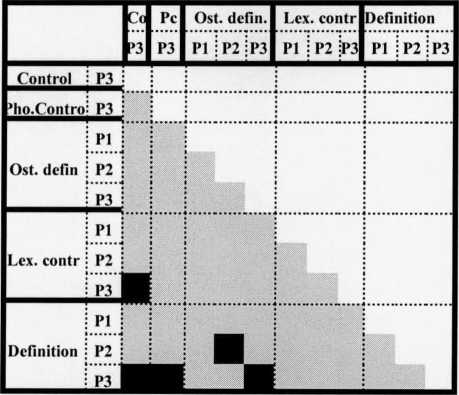significantly better than the Ostensive definition group (Wilcoxon: Z=2.7, p<.05). During
post test 3, the Definition group performed significantly better than the Control (Wilcoxon:
Z=3.2, p<.005) the Phonological control(Wilcoxon: Z=3.03, p<.005) and the Ostensive
definition group (Wilcoxon: Z=2.8, p<.005). The Lexical contrast group performed
significantly better than the Control group (Wilcoxon: Z=2.1, p<.05). Diagram 7.2 presents
the significant differences between the groups.
Diagram 7.2 Significant group differences in the multiple choice task across testing

Abbreviations: Phono-Co=Phonological control; Ostdefin=Ostensive definition; Lex. contr. Lexical contrast
Does children ,s performance on the Multiple choice task improve with increased exposure
to the lexical items?
No significant differences were found over time.
Does the children ,s prior knowledge of the lexical items influence performance on the
multiple choice task ?
Figure 7.5 shows that children’s performance on the multiple choice task did not differ by
their prior knowledge of the lexical items. Statistical analysis revealed no significant
differences.
205
More intriguing information
1. Determinants of Household Health Expenditure: Case of Urban Orissa2. An alternative way to model merit good arguments
3. Special and Differential Treatment in the WTO Agricultural Negotiations
4. An Attempt to 2
5. The name is absent
6. The name is absent
7. The name is absent
8. Do imputed education histories provide satisfactory results in fertility analysis in the Western German context?
9. Poverty transition through targeted programme: the case of Bangladesh Poultry Model
10. On s-additive robust representation of convex risk measures for unbounded financial positions in the presence of uncertainty about the market model